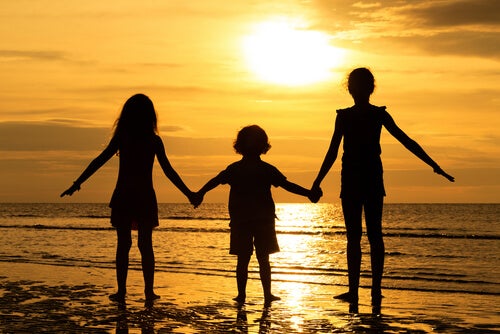Imagine, for a moment, going on a trip with your brothers and sisters, all adults, which of the following situations identifies the most?
1. Have you been planning your trip for weeks, with all that this entails: hotel reservations, car hire, restaurants?You’ve thought about your brothers all the time and been looking for time and space to disconnect emotionally.
- 2.
- You’ve run all day organizing things in a hurry.
- Making final arrangements and leaving your home ready for the days you’ll be away.
3. I find it super fun to make the family trip you have planned!You didn’t organize anything, you’ll just enjoy the experience, laughing and enjoying the company of your brothers. You appreciate the way your older brother organizes everything and you don’t need to move a straw.
Is situation number 1 familiar? You’re definitely the eldest of the brothers.
If the second corresponds to your personality or if you feel identified, you’re probably the middle child.
If you keep the last one, you’re definitely the youngest in the family.
Many researchers say the order in which a family was born is as important as sex and genetics. This leads us to reflect on the eternal doubt between “creation against the nature of people”.
Within the same family, no two children have the same parents. Why? Parents are different with each of their children because they never assume the same role, for example, if you are the one who takes care of the rest of your siblings, then your brother will assume another role, perhaps that of winner.
The eldest child is programmed for excellence and achievement; the middle child is raised to be understanding and accommodating, and the youngest seeks attention. The result makes the birth warrant of the brothers a powerful variable in personality development.
The three personality types are
The eldest son tends to have more in common with other older children than with his own siblings, people who, due to their condition of first child, had greater control from their parents, receiving a lot of attention when they were the first children. Firstborn.
They are usually very responsible people who can be trusted and who know how to behave, pay attention to themselves and their personal relationships, reflecting a version of their own parents.
If you’re the dest, you’re sure to like getting each other’s approval and making great accomplishments simply because you’re predisposed to it.
They’re conducive to leadership professions, as an older brother, you’re looking to dominate your brothers.
What is very characteristic of this position within a family is the fact that when son number two arrives, the older brother will feel and feel a sense of loss, loses the position of feeling unique and the attention that was his only can hurt. But everything that has been learned before will allow them to change quickly and forcefully.
Siblings in the field are generally friendly, cooperative and adaptive, although they can also have competitive characteristics.
They care a lot about equality and will work within the family for justice and equality for each member. They usually have a circle of close friends who represent an additional part of their family.
As a middle child, they receive less attention from their families, and these fellow laughs and experiences they have chosen are their compensation.
They usually take a while to mature, but end up succeeding in powerful races that allow them to use their negotiating skills and get all the attention they need.
The older brother and the middle brother will never be good in this area. The personality trait that defines the child in the environment is usually the opposite of the older or younger sibling. The good thing is that these incredible social skills they have acquired can prepare them to become great successful entrepreneurs.
If you’re the youngest child, your parents have already gained enough self-confidence in their roles as parents and caregivers, allowing them to be more forgiving and not pay as much attention to all their movements as they used to be with their older siblings.
This situation leads them to learn to receive the attention of those around them thanks to their sympathy and charm.
Younger people have more freedom than their siblings, they are more independent, they look a lot like their older brother, because the two extremes are special, they quickly find their position and they identify themselves in their own place, which makes them safe.
They usually choose artistic and creative careers, such as writing, art, and theater. They can also be good doctors and teachers. The flexibility of their parents gives them fantastic freedom to foster their personal creativity.
They have less responsibility and therefore seek experiences with great responsibility. I was able to personally verify this feature with my younger brother, as I looked like the youngest in the family.
Unique children grow up surrounded by adults, being more verbal and more mature, this condition allows them to gain intelligence and easily overcome any other differences in the order of birth.
Spending so much time alone leads them to be more resourceful, creative and to believe in their independence. They also tend to have a lot in common with their parents, often following them in their respective careers.
I invite you to look in a little more detail at your brothers and sisters at the next family reunion, and to see if or not you identify the characteristics of each position in the order of birth. I’m sure you’ll have fun.
Are you the dest, the middle or the youngest?

